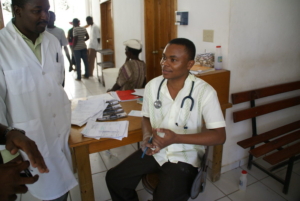Partners in Health Aids Poverty Reduction Through Health Care
 Partners in Health (PIH) is a nonprofit global health organization committed to providing better health care to people struggling with extreme poverty across 11 countries. PIH strives to build relationships with sister organizations in countries where poverty is a major issue, aiming to improve health care access. It achieves this through two main approaches: delivering the benefits of modern medical science to those most in need and serving as an antidote to despair.
Partners in Health (PIH) is a nonprofit global health organization committed to providing better health care to people struggling with extreme poverty across 11 countries. PIH strives to build relationships with sister organizations in countries where poverty is a major issue, aiming to improve health care access. It achieves this through two main approaches: delivering the benefits of modern medical science to those most in need and serving as an antidote to despair.
Poor health care and overall health significantly contribute to poverty in a country’s population. Many people living in poverty cannot afford treatment, leading to untreated illnesses and long-term health issues. However, stronger health care systems enable developing countries to enhance the overall status of their health services. Providing better health care means the population is healthier, can work, attend school and thrive rather than survive. Additionally, improving health care in developing nations boosts the economy, as a healthier population is more productive, contributes more effectively to the workforce and stimulates economic growth.
Global Reach and Mental Health Initiatives
PIH operates in countries across four continents, including Haiti, Rwanda, Peru, Mexico, Malawi, Liberia, Sierra Leone, Lesotho, Kazakhstan and the United States (U.S.). The organization strengthens public health systems to ensure patients receive necessary care in their homes, local clinics or regional hospitals. Globally, PIH employs approximately 18,000 staff members, 99% of whom are from the countries where it serves.
PIH has established the Cross-Site Mental Health Program as one of its initiatives to support mental health development in the countries where it operates. Unlike many other NGOs, PIH strongly emphasizes community-based, primary care and hospital-linked mental health systems. This program addresses severe mental health conditions in areas that typically have little support for mental health.
Vision and Strategy for Mental Health Care
Many factors contribute to mental health issues, with some of the primary ones being homelessness or lack of home security, unemployment or unreliable income and family breakdowns, often due to the separation of families. While numerous other factors can affect mental health, many people living in poverty experience at least one of these issues. PIH aims to make the greatest impact on these individuals.
Partners in Health (PIH) aims to enhance the lives of poorer communities globally by increasing mental and psychological support in developing countries. Through its PIH Mental Health Value Chain, the organization strives to ensure that people receive the treatment they need, enabling them to lead better lives and escape poverty. The PIH model is built on four key pillars designed to improve mental health care in developing nations and enhance lives through better health care. The key pillars are as follows:
- Clinical care and training. Mental health requires professionals trained to address such issues. Therefore, this pillar offers the necessary supervision and mentorship to support mental health initiatives.
- Program management. This approach ensures that resources are directed in the most efficient ways to optimize their use.
- Meaningful data collection. Research is essential for gaining a better understanding of issues in developing nations through monitoring and evaluation.
- Shared learning. The Cross-Site Mental Health Learning Collaborative enhances understanding of mental health issues through both in-person and technological interactions.
Health Care Improvements in Haiti
By improving health care related to mental illnesses, developing nations can boost morale and begin to reduce poverty levels, as poverty and mental health issues are often interconnected. People experiencing poverty are typically more at risk of mental health issues, so addressing mental health can also help decrease poverty. An example of Partners in Health’s (PIH) efforts to provide better mental health care is its work in Haiti, a developing Caribbean island nation with a long history of economic and political turmoil, natural disasters and postcolonial exploitation.
PIH and its partners have developed a more reliable health care system in Haiti, previously unavailable in the country. The program has integrated mental health into primary care through a task-sharing model in collaboration with the Ministry of Health (MOH). As a result, psychologists, social workers, nurses, physicians and community health workers have become more common in the country, enhancing health care provision. This improvement means that people living in poverty have better access to care and increased chances of recovery. An enhanced health care system benefits developing countries in four main ways: it boosts productivity, reduces absenteeism from work and school, decreases poverty and improves quality of life.
Looking Ahead
As Partners in Health (PIH) expands its efforts to provide health care and mental health services in impoverished regions, the organization continues to make a significant impact on global health outcomes. By collaborating with local entities and enhancing health care infrastructure, PIH is fostering resilience and a better quality of life for communities in need. Moving forward, its work in improving health care access and mental health support promises to contribute to the economic and social development of the countries it serves, leading to more sustainable and healthier futures.
– Lachlan Wellington
Lachlan is based in Fareham, UK and focuses on Technology and Global Health for The Borgen Project.
Photo: Flickr
